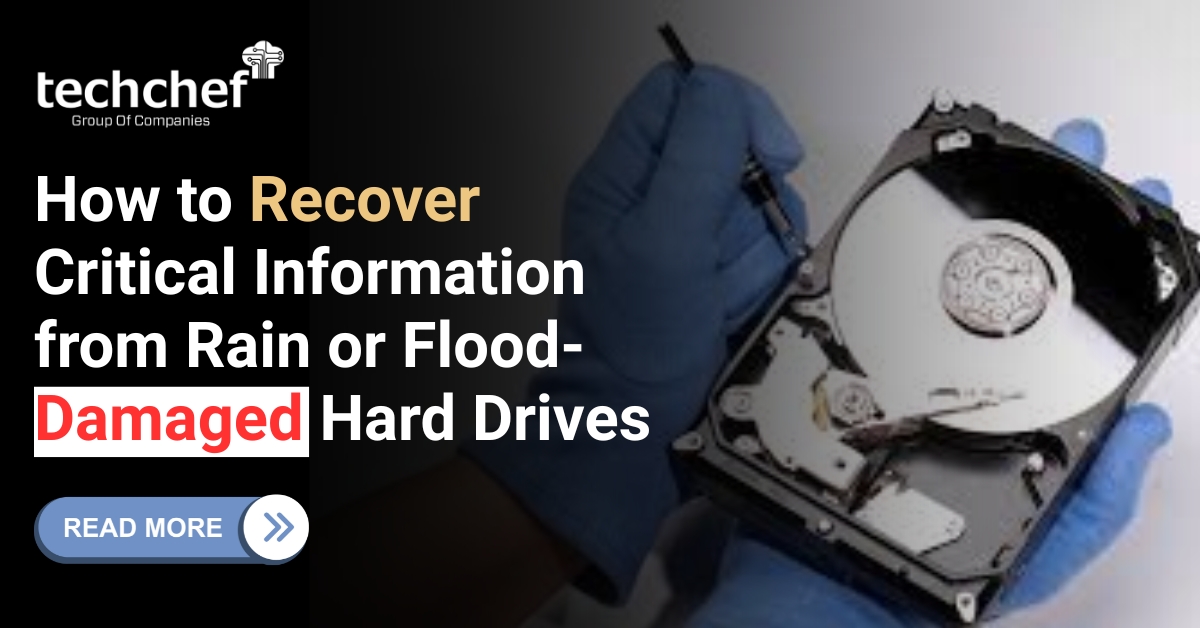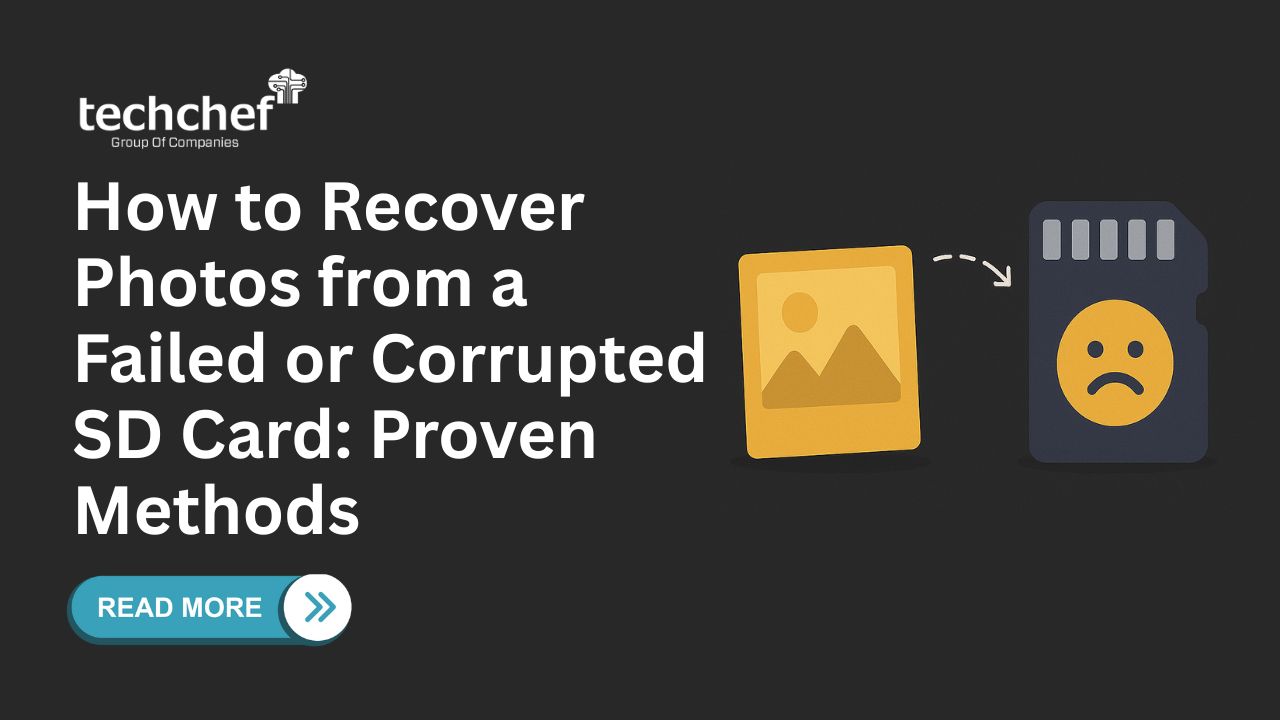Nowadays data is more than a collection of letters and numbers, it become an essential part of our personal as well as professional lives. We store this crucial data in various storage devices like SSDs, HDDs, flash memory, etc. From our personal to professional data, from our cherished memories to business files, we store everything in these devices.
Day by day our dependency on these devices is increasing. Imagine one day you met with drive failure and all your data is lost. I know only a single thought of this moment scares you, so what is the solution, how can you save your crucial data?
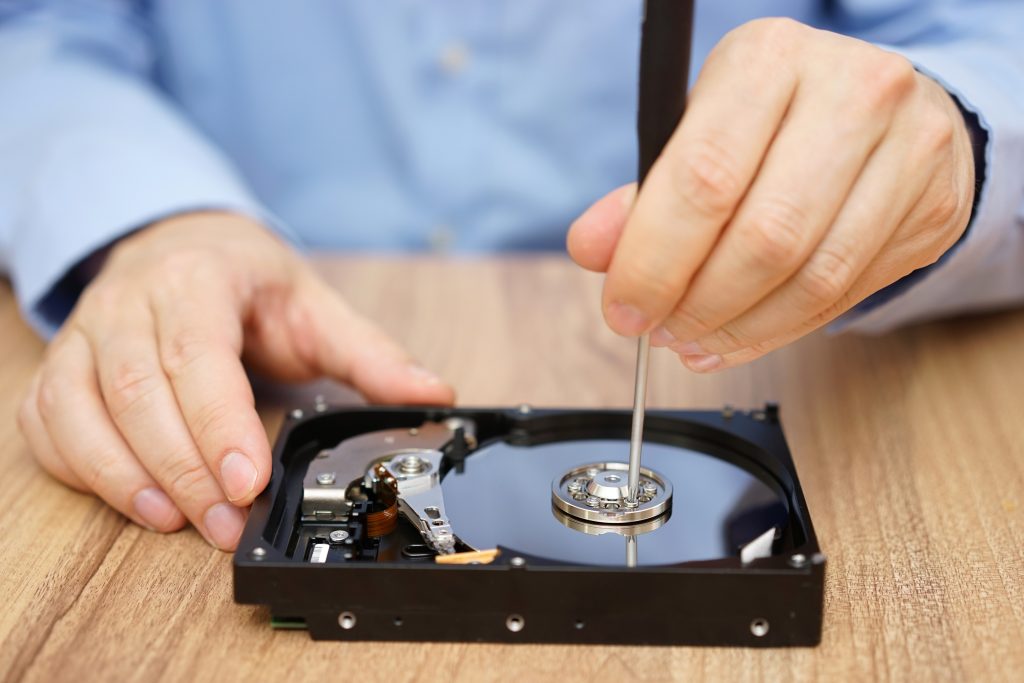
Hard Disk Data Recovery
Hello tech lovers! Today I come up with the solution to your most popular question. In this article, I will discuss the best solutions for data recovery from a hard disk. But before discussing the solutions, I will tell you what the root causes behind data loss and how you can prevent data loss with simple and easy steps besides this we will learn which HDD model is best according to your needs.
Understanding Data Loss: Why Does It Happen
Understanding why data loss happens is crucial for prevention. Whether due to hardware failures, human error, software corruption, or power issues, knowing these causes can help you take proactive steps to protect your valuable information.
1. Hardware Failures
Hard disks, like all hardware, have a limited lifespan, and components of these devices can wear out, leading to malfunctions. Mechanical failures, such as a crashed disk or damaged read/write heads, are common culprits.
2. Human Error
Accidental deletion of files, formatting the wrong drive, or improper handling of the device can result in data loss. Even simple mistakes can have significant consequences.
Did you know? Most data loss incidents are caused by human error, accounting for about 29% of all data loss cases.
3. Software Corruption
Operating system crashes, corrupted files, or software bugs can lead to data being inaccessible. Viruses and malware also cause a significant threat by corrupting files or locking you out of your system.
4. Power Surges and Outages
Sudden power interruptions can cause data to be lost or corrupted. Without proper surge protection or backup power solutions, your hard drive is vulnerable to these events.
5. Environmental Factors
Extreme temperatures, humidity, or physical shocks can damage your hard disk. Proper storage conditions are essential to prevent environmental damage.
Early Signs of Data Loss
Recognizing the early signs of data loss can save you from significant headaches. Identifying issues like unusual noises or frequent crashes early allows you to take immediate action, potentially preventing complete data loss and ensuring your valuable information remains safe.
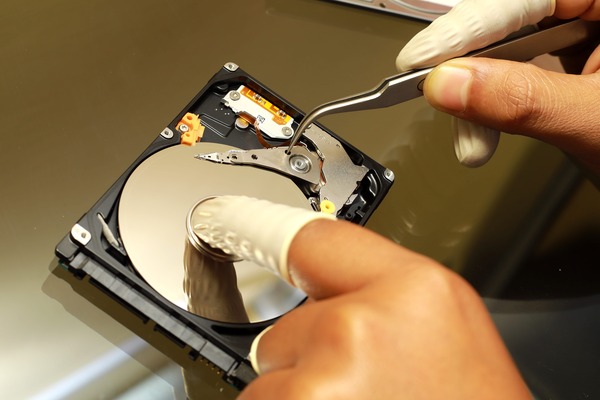
1. Strange Noises
Clicking, grinding, or whirring sounds from your hard disk can indicate mechanical issues. These noises often precede a complete failure.
2. Frequent Crashes
If your system crashes or freezes regularly, it might be a sign of an impending hard disk failure. Pay attention to these warnings and back up your data immediately.
3. Slow Performance
A noticeable slowdown in your computer’s performance, especially when accessing files, could indicate a failing hard disk.
4. Corrupted Files
If files become corrupted or inaccessible, this could be a sign of data loss. This is especially concerning if it happens frequently.
Types of Data Loss
Data loss can strike in various forms, each posing unique challenges. Understanding the different types- logical, physical, mechanical, and electronic failure helps you better prepare and respond effectively when your valuable information is at risk.
1. Logical Data Loss
Logical data loss occurs when files are deleted, the drive is formatted, or the file system is corrupted. The physical hardware remains unbroken, but the data is inaccessible.
2. Physical Data Loss
Physical damage to the hard disk, such as a head crash or motor failure, falls under this category. Specialized equipment and cleanroom environments are often required for recovery.
3. Mechanical Failures
Mechanical failures involve moving parts within the hard disk, such as the read/write heads or spindle motor. These types of failures often result in a complete loss of access to the data.
4. Electronic Failures
Electronic failures occur when the hard disk’s circuit board or other electronic components malfunction. This can prevent the drive from being recognized by the computer.
Immediate Steps After Data Loss
Taking quick action is crucial. Learn essential steps to mitigate the impact and increase the chances of successful recovery. Protect your valuable data with informed decisions.
1. Stay Calm and Stop Using the Drive
The moment you realize data loss, stop using the hard disk. Continuing to use the drive can overwrite the lost data, making recovery more challenging.
2. Check for Backups
Always check if you have a recent backup of your data. Regular backups can save you from a lot of stress and data loss scenarios.
3. Assess the Situation
Determine if the data loss is due to physical damage, logical errors, or accidental deletion. This assessment will guide you on the next steps.
Tips to Prevent Data Loss
Preventive Data Loss tips are crucial in protecting your valuable information. By adopting proactive measures such as regular backups and careful handling, you can mitigate risks and ensure the security of your data.
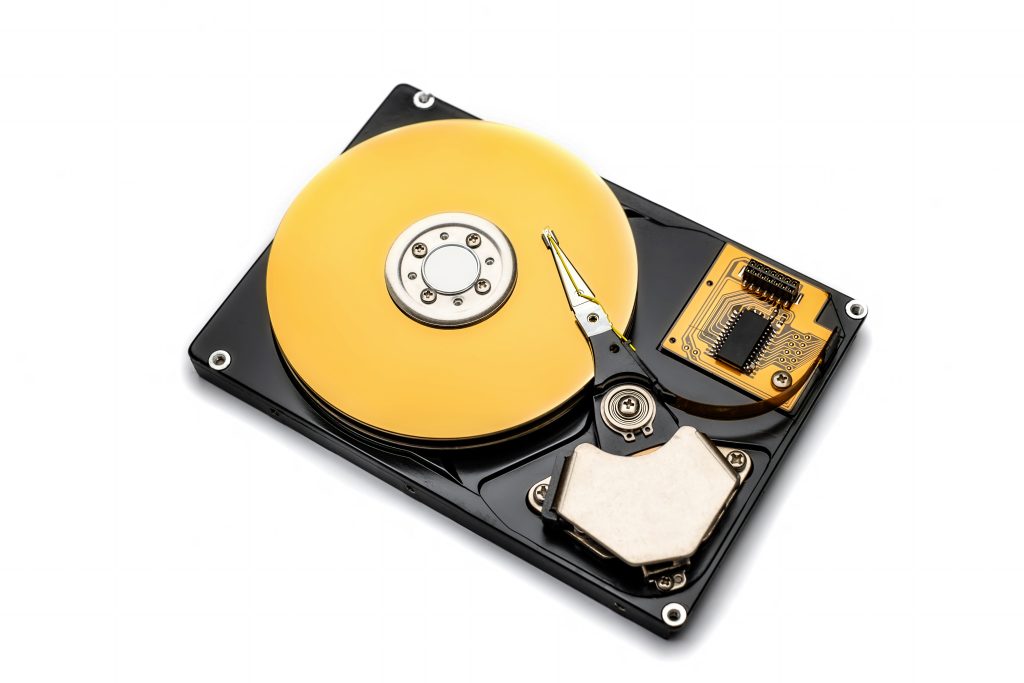
1. Regular Backups
Regularly back up your data to multiple locations, such as external hard drives, cloud storage, or network-attached storage (NAS). Automated backup solutions can help ensure you never forget to back up your important files.
“Backups are a digital life-saver. Regular backups ensure your data safety even in the worst data loss scenario” – Tech Expert.
2. Use Surge Protectors
Protect your hardware from power surges and outages by using surge protectors and uninterruptible power supplies (UPS). This can prevent sudden power issues from damaging your hard disk.
Did you know? Using a surge protector for your computer can significantly reduce the risk of data loss caused by power outages and electrical surges.
3. Handle with Care
Avoid physical shocks to your hard disk. Treat it gently, especially when moving or transporting it, to prevent mechanical damage.
4. Monitor Hard Disk Health
Use tools to monitor the health of your hard disk. Many operating systems have built-in utilities, or you can use third-party software to monitor performance and potential issues.
5. Keep Software Updated
Regularly update your operating system and software to protect against bugs and vulnerabilities that could lead to data loss. Use reliable antivirus software to guard against malware that corrupts and deletes your files.
DIY Methods to Avoid in Data Recovery from Hard Disk
I know it’s tempting to try do-it-yourself (DIY) methods to recover your data, and we take it as a fun task. However, certain popular techniques can do more harm than good. Here are some common DIY methods you should avoid:
1. Rice for Water Damage
While placing a water-damaged hard drive in rice is a widely suggested method, it’s ineffective. Rice does not effectively remove moisture from complex electronic components. Instead, it can leave your hard drive with remaining moisture, increasing the risk of corrosion.
2. Hair Dryer
Using a hair dryer to dry a wet hard drive can cause severe damage. The high heat can melt internal components, making data recovery even more difficult, if not impossible.
3. DIY Recovery Software
While there are many data recovery software options available, their misuse can lead to permanent data loss. These tools can overwrite your lost data, making recovery impossible. Additionally, they often lack the advanced features necessary to handle severe data loss situations.
Pros and Cons of DIY Methods for Data Recovery From Hard Disk
Pros:
Cost-Effective: DIY methods are often cheaper than professional services.
Convenience: Easily accessible and can be attempted at home.
Cons:
Risk of Further Damage: Improper methods can worsen the situation.
Lower Success Rates: Professional recovery methods have higher success rates than DIYs.
Limited Capability: DIY methods may not work for severe or complex data loss scenarios.
Key Advice: As I explained above there are more disadvantages over advantages of DIYs so, as a tech expert I Request you, not to try any DIY methods as they can severely damage your devices and can make data recovery more complex.
The Best Solutions for Data Recovery from Hard Disk
When met with data loss, having effective recovery solutions at hand can be helpful. It’s crucial to understand the best approaches for hard disk data recovery to protect your critical information and minimize the impact of unforeseen data loss incidents.
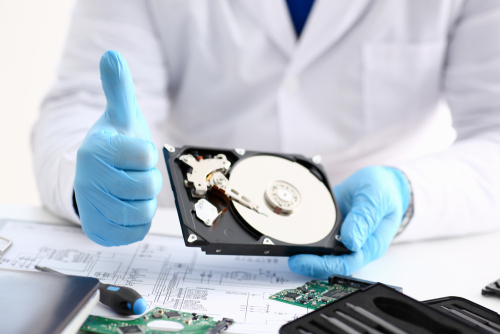
1. Professional Services for Data Recovery from Hard Disk
Professional hard disk data recovery services like Techchef offer the expertise and tools necessary to recover data from severely damaged hard disks. These services often have cleanroom facilities to handle sensitive recovery operations.
2. Data Recovery Software
There are many reliable software available for data recovery from hard disk for logical data loss. These tools can scan your hard disk for recoverable files and restore them. However, use these tools with caution and avoid overwriting your lost data.
3. RAID Data Recovery
For businesses using RAID configurations, specialized RAID data recovery services are available. These experts can rebuild the RAID array and recover the data, even from failed drives.
4. Cloud Backup Solutions
Cloud backup solutions provide an added layer of protection. In the event of hardware failure, your data is safely stored in the cloud, accessible from any device with an internet connection.
Popular Hard Disk Drive (HDD) Models and Their Manufacturers
When it comes to choosing a reliable hard disk drive (HDD), several models stand out for their performance, durability, and brand reputation. Here are some popular HDD models along with their respective manufacturers:
Seagate
Seagate BarraCuda
Model: BarraCuda 4TB
Features: High capacity, reliable performance, suitable for desktops and all-in-one PCs.
Seagate IronWolf
Model: IronWolf 6TB
Features: Optimized for NAS with AgileArray technology, excellent for multi-user environments.
Seagate SkyHawk
Model: SkyHawk 8TB
Features: Designed for surveillance, supports up to 64 HD cameras, 24/7 operation.
Western Digital (WD)
WD Blue
Model: Blue 2TB
Features: Reliable everyday computing, perfect for desktops and laptops.
WD Black
Model: Black 6TB
Features: High performance for gaming and high-end computing, enhanced reliability.
WD Red
Model: Red 4TB
Features: Built for NAS systems, supports 24/7 operation, optimized for RAID environments.
Toshiba
Toshiba X300
Model: X300 5TB
Features: High performance for gaming and creative applications, large cache for faster data access.
Toshiba N300
Model: N300 8TB
Features: Ideal for NAS systems, high reliability for 24/7 operation, powerful design.
Toshiba P300
Model: P300 3TB
Features: Versatile and reliable for everyday computing, enhanced performance.
HGST (a Western Digital subsidiary)
HGST Ultrastar
Model: Ultrastar DC HC520 12TB
Features: Enterprise-grade reliability, high capacity for data centers, designed for 24/7 operation.
HGST Deskstar
Model: Deskstar NAS 6TB
Features: Optimized for NAS systems, high performance, and reliability.
These HDD models are widely recognized for their reliability and performance across different applications, from everyday computing and gaming to enterprise-level data storage and surveillance. When selecting an HDD, consider your specific needs and the features offered by these trusted manufacturers.
Final Words
Data loss can be a stressful experience, but with the right knowledge and tools, you can navigate it successfully. By understanding the causes of data loss, recognizing early signs, implementing preventive measures, and the best solutions for data recovery from hard disk, you can protect your data effectively.
At Techchef, we understand the importance of your data. Our professional hard disk data recovery services are designed to handle even the most challenging data loss scenarios.
Contact us today at 1800-313-1737 for data recovery from a hard disk and learn more about our data recovery services and how we can help you protect your valuable information.




